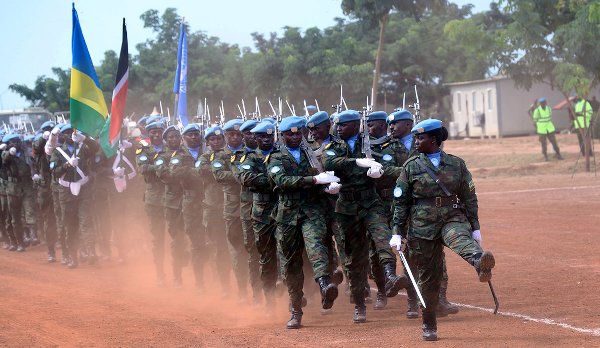
By Janet Adongo
Kigali: At the tender age of ten, Captain Leonie Niyonsaba was admitted to hospital in her home country Rwanda. She remembers being so well cared for that she decided to become a doctor.
“But that was long after I had already made up my mind that I would join the army,” she says. “Having witnessed first hand the injustice and insecurity around me, I vowed to myself to become a soldier.”
And here she is, in Malakal, living not one but two of her childhood dreams. The petite, soft-spoken, yet determined 29-year-old is currently a medical doctor serving with the Rwandese military contingent of the United Nations Mission in South Sudan. She oversees the work of twenty other doctors, paramedics and nurses.
“My day to day work involves ensuring that the soldiers are able to operate. They need to be in good health for this.”
Captain Niyonsaba hasn’t stopped at just performing her regular duties. As a female doctor, she is also often called upon to interview survivors of conflict-related sexual violence and other atrocities commonly suffered by South Sudanese women.
Far from being a two-trick pony, Leonie has also made herself a name as a role model for young girls and women at school career days in the Upper Nile region. Not only that: the multi-skilled Captain uses spare moments to teach mostly lair-bound females how to make Rwandese-style, economical and environmentally friendly stoves, thus saving them many a jaunt into risky, off-the-beaten track locations to collect firewood.
Her popular trainings have seen her visit areas throughout the region, including territories occupied by the opposition.
“As women we have so much to contribute to our communities, our countries and the world,” she says. “We have the power to play an important role in development, peace building and reconciliation.”
A worthier recipient of a UN medal for outstanding service in the name of durable peace in South Sudan would be hard to come by, and as it happens, Captain Niyonsaba has recently received one.
She shared this honour with almost 800 other Rwandese male and female peacekeepers serving in the world’s youngest country. The medals were handed out at a colourful ceremony celebrated with both traditional dancing and a display of martial arts.
One medalist was Major Wilson Rurangwa, a man with an interesting backstory of his own. Long before the young Captain Niyonsaba had even begun to dream, her senior colleague was living in a refugee camp in Uganda, having fled civil war in his native Rwanda.
“Growing up in a refugee camp gave me the resolve to join the army,” he says. “At first, I joined to defend myself, but I quickly learned that being in the army was not just for me and my family, but for thousands of other men and women as well, including here in South Sudan.”
Major Rurangwa heads the operations of the entire battalion, coordinating and supervising the daily activities of the whole lot. He draws a parallel between Rwanda and South Sudan and encourages the locals to look for homegrown solutions to their country’s problems.
“I hope one day, my brothers and sisters from South Sudan will learn to use their natural resources as an opportunity for development and not as a source of conflict.” (End)
